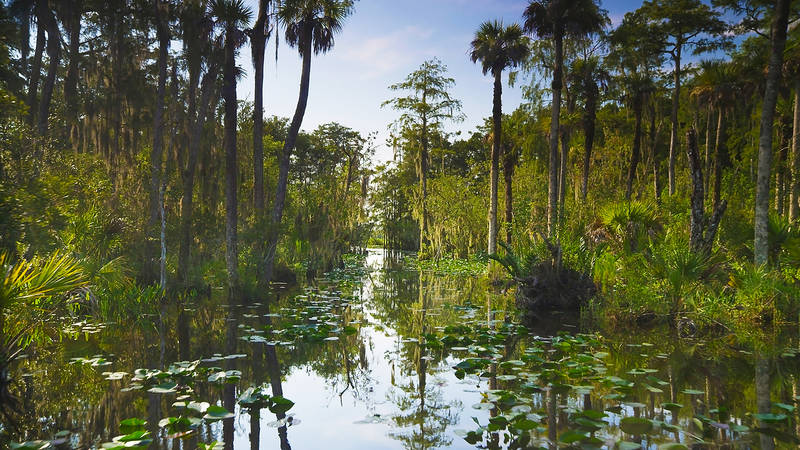Despite ongoing lawsuit, destructive seismic exploration set to start in Big Cypress’ sensitive wetlands.
Naples, FL – The Burnett Oil Company has set March 27 as the date they will begin the process of surveying for oil and gas resources beneath Big Cypress National Preserve in Florida, even as a federal judge has yet to rule whether the work can proceed.

Why NPCA Is Suing the Park Service over Testing at Big Cypress
NPCA regularly supports the National Park Service and its core mission to protect our nation’s most iconic and inspirational places. But when the agency recently approved plans to allow extensive…
See more ›The National Park Service approved seismic surveys on 110 square miles of sensitive wetlands in Big Cypress, including cypress forests, grasslands and eligible wilderness using 33-ton “vibroseis” trucks, which will flatten sensitive vegetation, damage soils and disturb sensitive wildlife. The four phases of exploration will ultimately encompass more than 360 square miles, or one-third of the Preserve.
The National Parks Conservation Association, Natural Resources Defense Council, Conservancy for Southwest Florida, Center for Biological Diversity, Earthworks, and South Florida Wildlands Association are challenging that approval. According to the groups’ lawsuit, the environmental impact of driving massive trucks and equipment through sensitive wetland areas has not been adequately studied. The parties appeared before the U.S. District Court for the Middle District of Florida on the groups’ Motion for Preliminary Injunction on March 3, and are still awaiting a ruling.
In its latest court filing, Texas-based Burnett Oil Co. cites a finding by the National Park Service on March 10, 2017 that, in its view, conditions in the preserve would be dry enough for the company to begin seismic testing as of March 22. Burnett Oil claims that it will be ready to begin preliminary scouting on March 27, and seismic testing on April 19.
“We are extremely disappointed that Burnett Oil will not wait for the court to rule on our case before starting work inside the Preserve,” said John Adornato III, National Parks Conservation Association’s Sun Coast Regional Director. “The impact of seismic testing in the national park site has not been adequately studied, and moving forward in the middle of a court case will put Preserve resources and wildlife at risk.”
Big Cypress National Preserve was transferred to the federal government in 1974. At that time, many of the minerals (namely, oil) located beneath the preserve remained privately held. However, the federal government has the authority and responsibility to regulate the exploration and extraction of privately-owned minerals, and may limit surface access to protect the ecological integrity of the Preserve.
“This kind of development is incompatible with the mission of Big Cypress, and may permanently damage the landscape of the Preserve,” said Matt Schwartz of the South Florida Wildlands Association. “Driving enormous vehicles off-trail and over sensitive wetlands will likely to lead to severe impacts on soils, plants, hydrology, and endangered wildlife.”
The seismic testing alone can impact endangered species, defoliate and flatten vegetation, alter hydrology, and compact and rut sensitive soils, among other damage it can cause.
“The Big Cypress is an essential area for many wildlife species, including the red-cockaded woodpecker, wood stork, and Florida panther” stated Amber Crooks of Conservancy of Southwest Florida. “It is also an important landscape for people as it provides important underground drinking water resources.”
“The beautiful natural landscape and precious wildlife in Big Cypress attract some 1.1 million visitors a year—so it’s not only environmentally, but economically, important to the state of Florida,” added Alison Kelly of the Natural Resources Defense Council. “The National Park Service has a duty to protect Big Cypress for the use and enjoyment of all Americans and future generations. To that end, it should have fully studied the environmental impacts of the oil company’s unprecedented seismic exploration proposal prior to allowing it.”
“Big Cypress is a national treasure, so we can’t let it be ripped up by these massive trucks,” said Jaclyn Lopez, Florida director of the Center for Biological Diversity. “This precious resource deserves so much better.”
###
About National Parks Conservation Association
Since 1919, the nonpartisan National Parks Conservation Association has been the leading voice in safeguarding our national parks. NPCA and its more than one million members and supporters work together to protect and preserve our nation’s natural, historic, and cultural heritage for future generations. For more information, visit www.npca.org.
For Media Inquiries
-
General
-
- NPCA Region:
- Sun Coast
-
Issues


